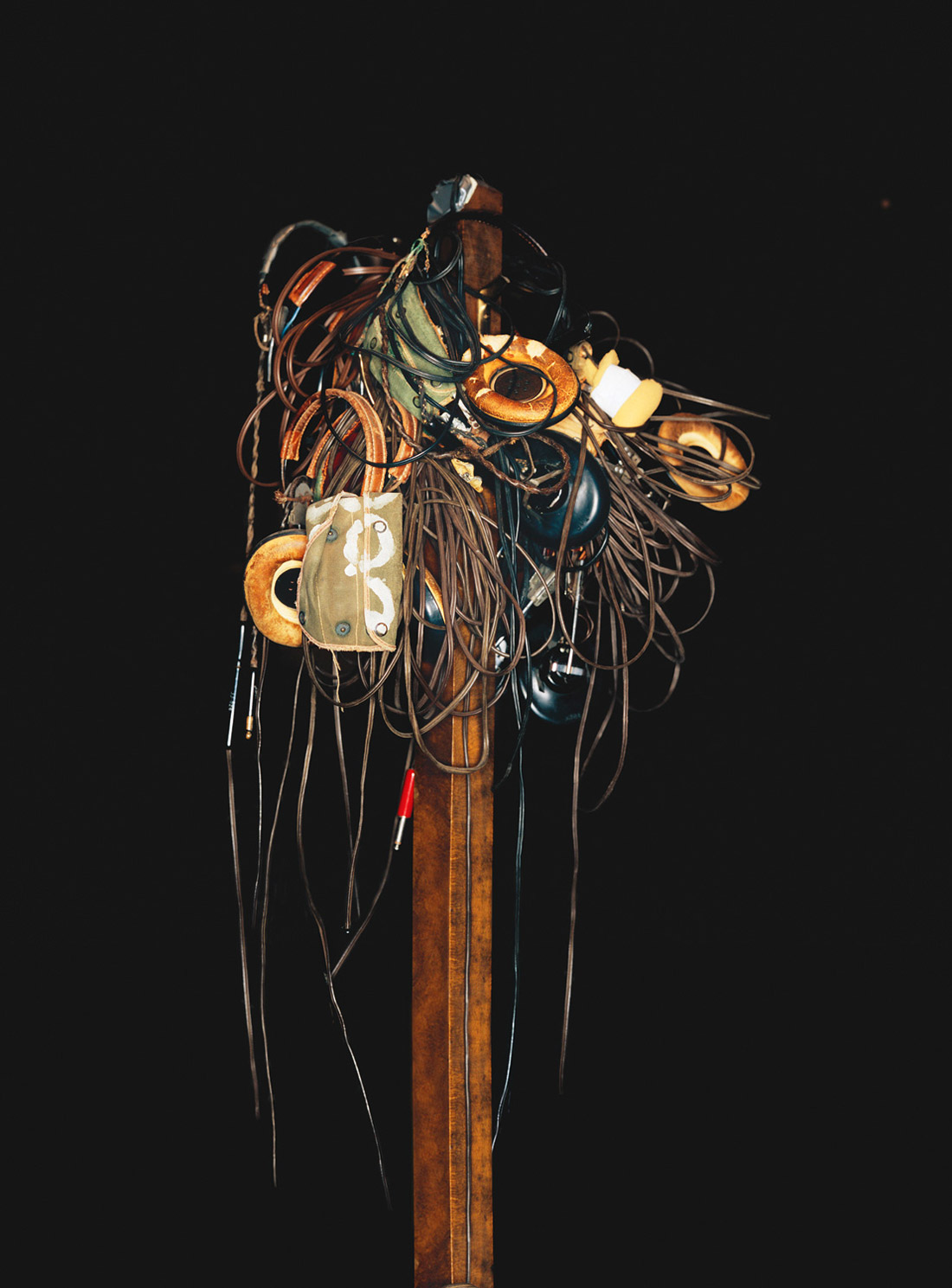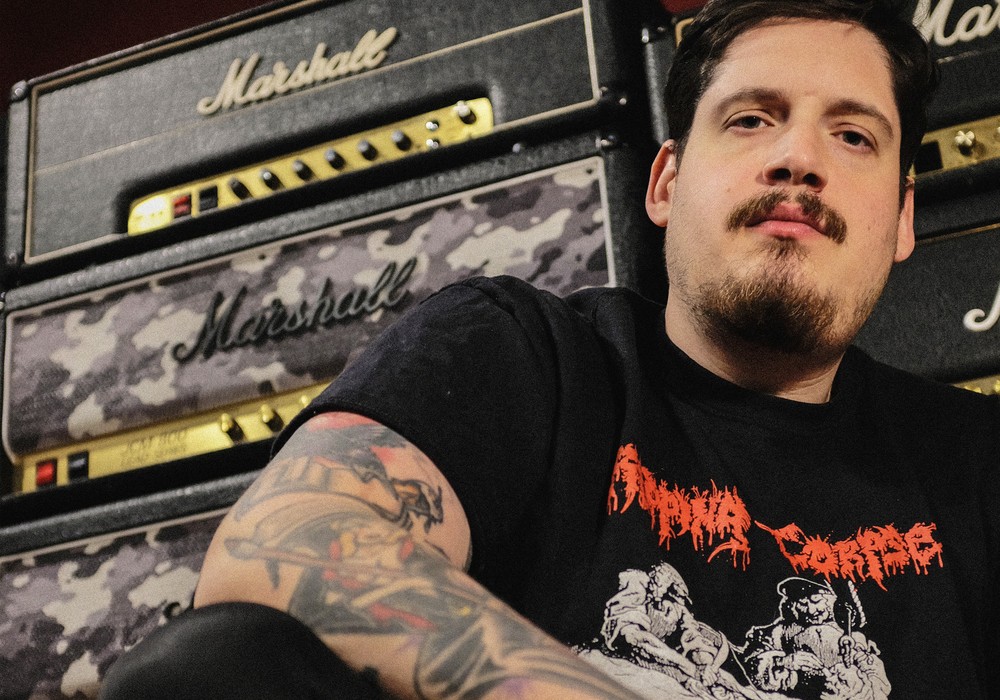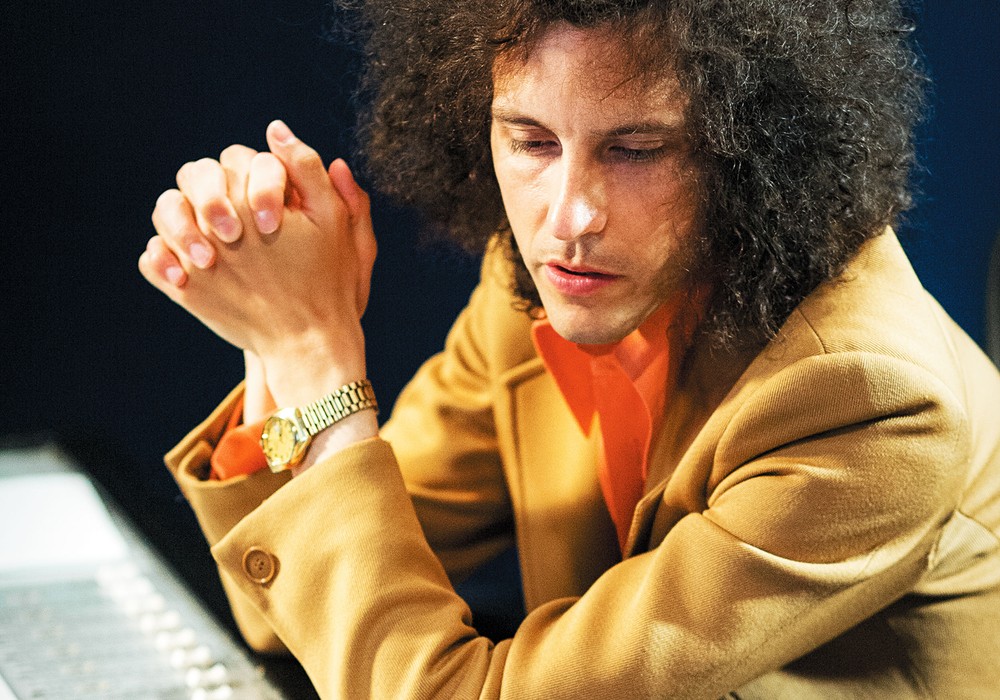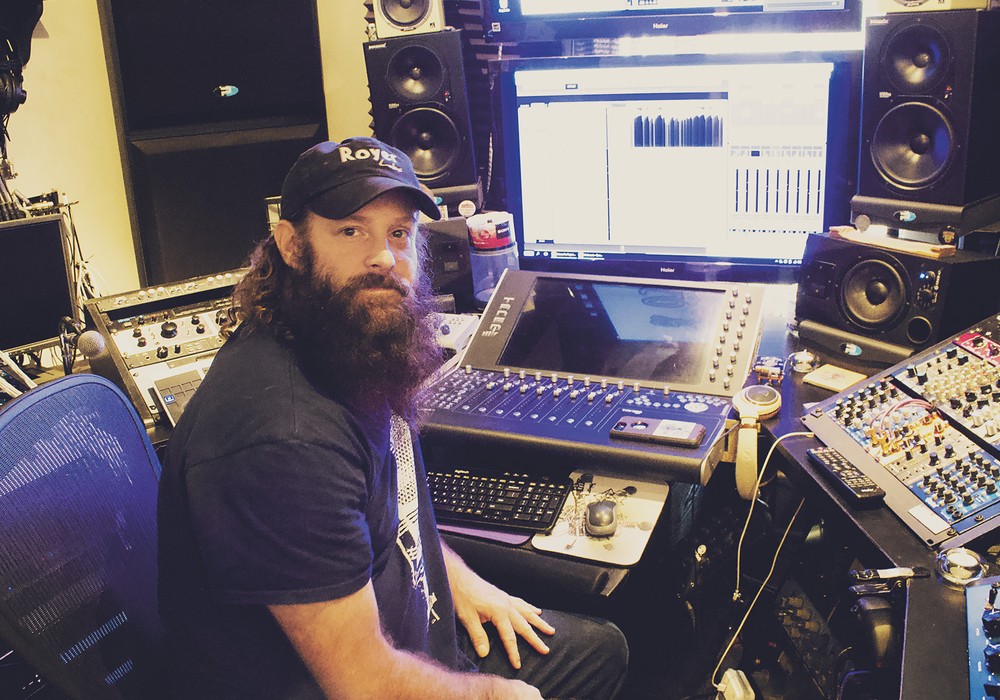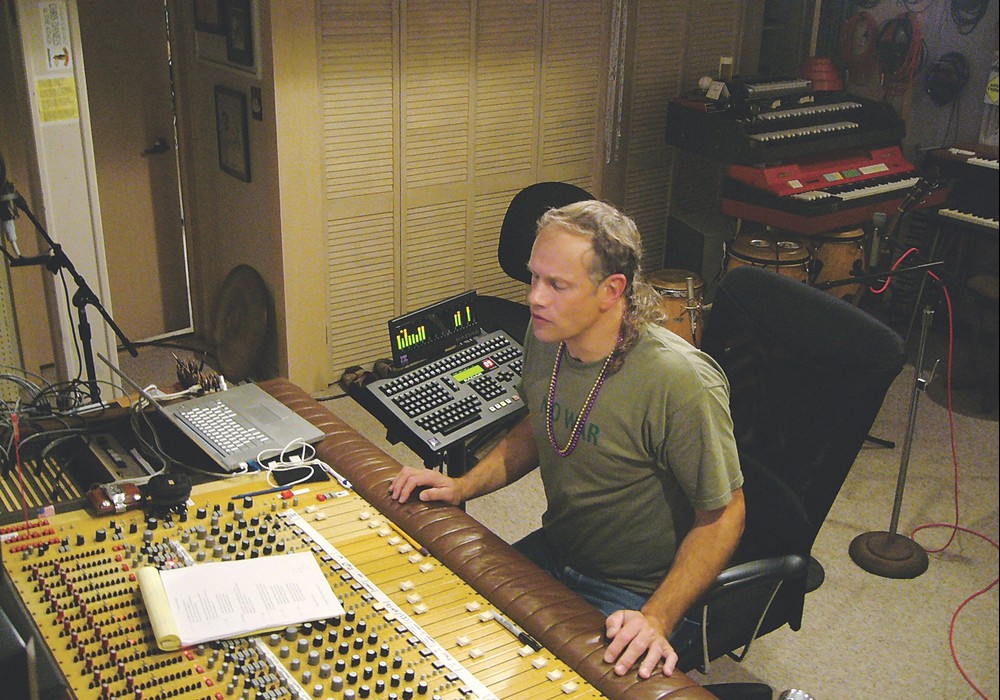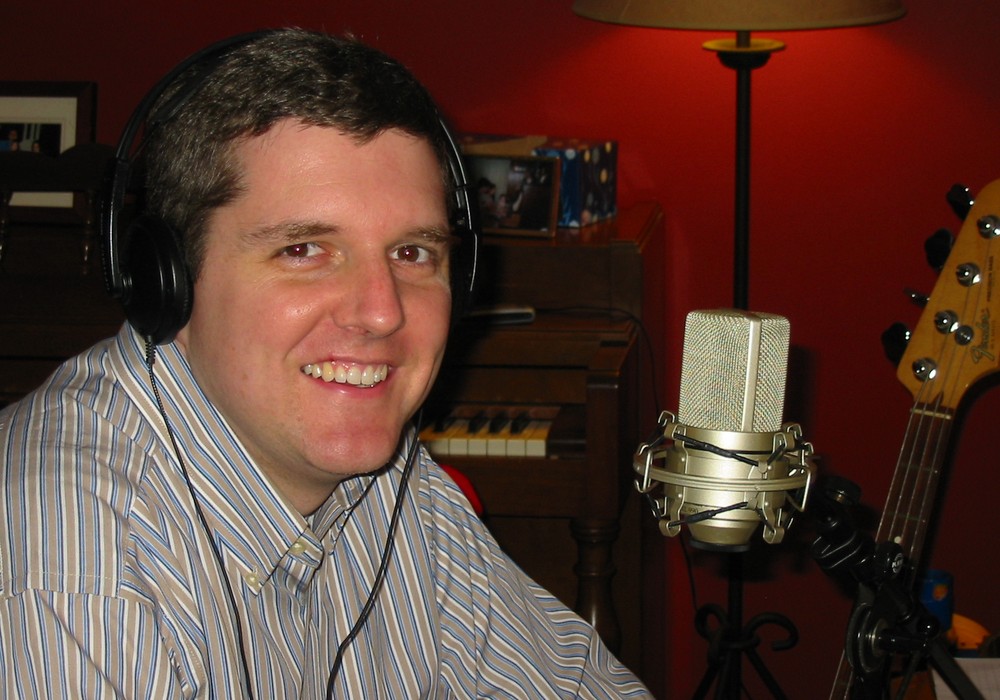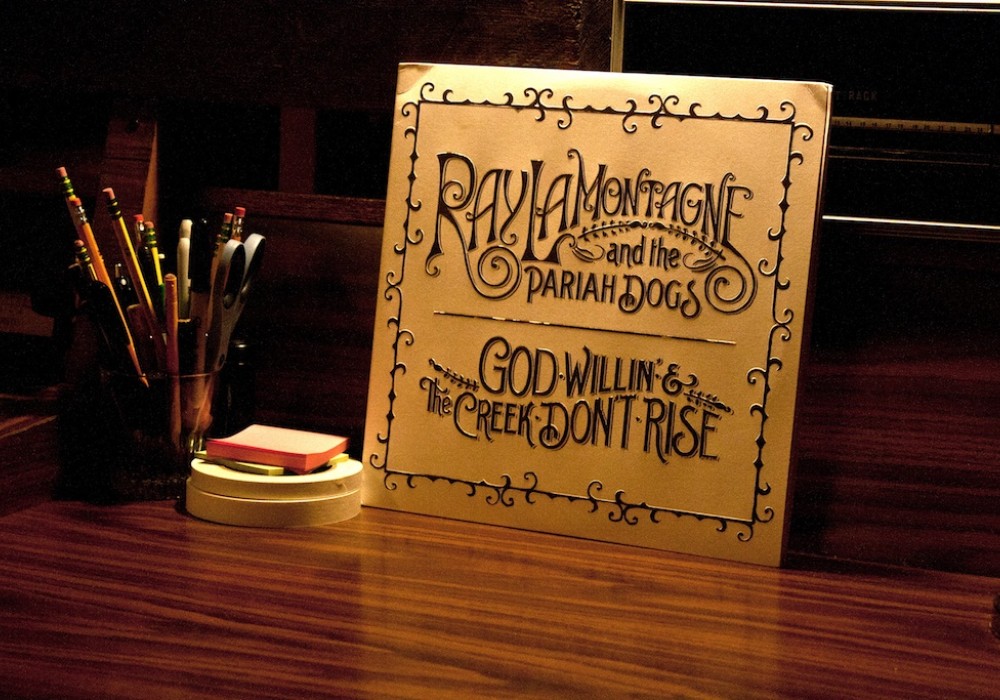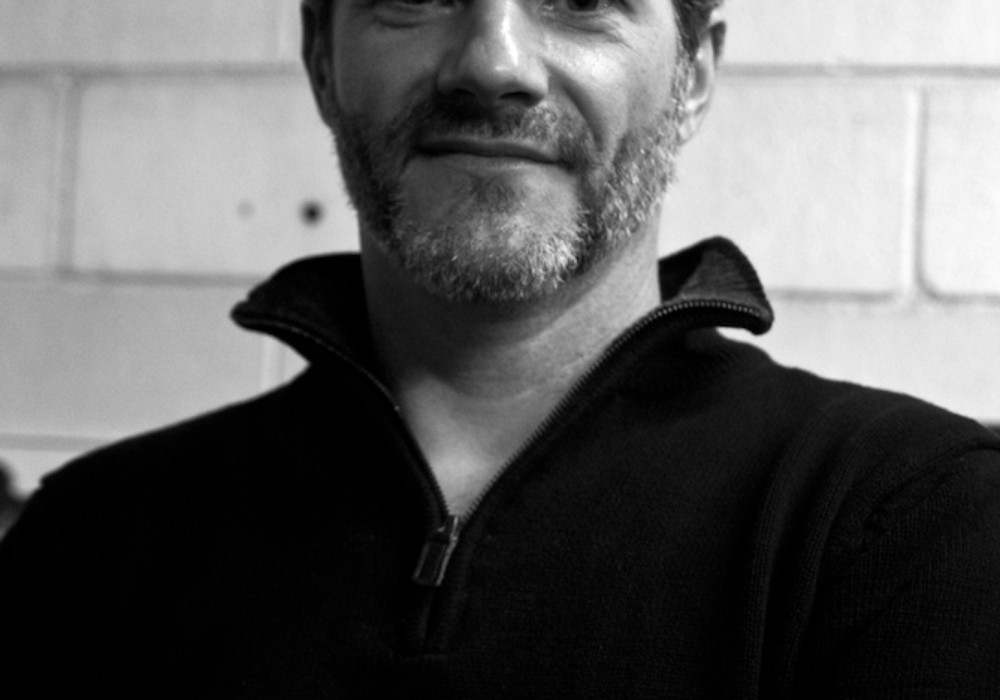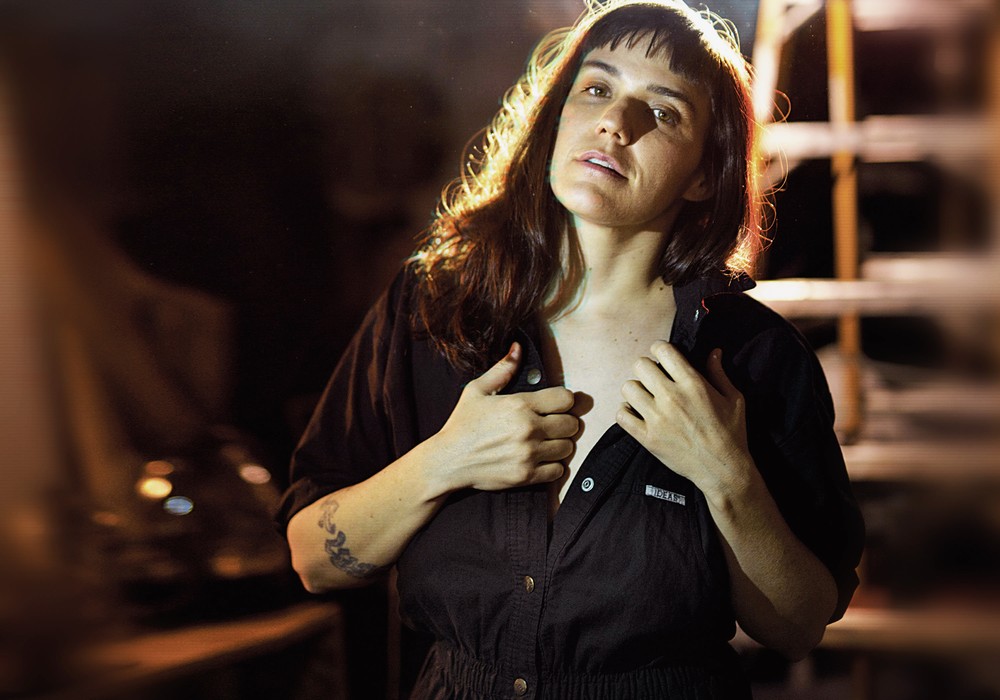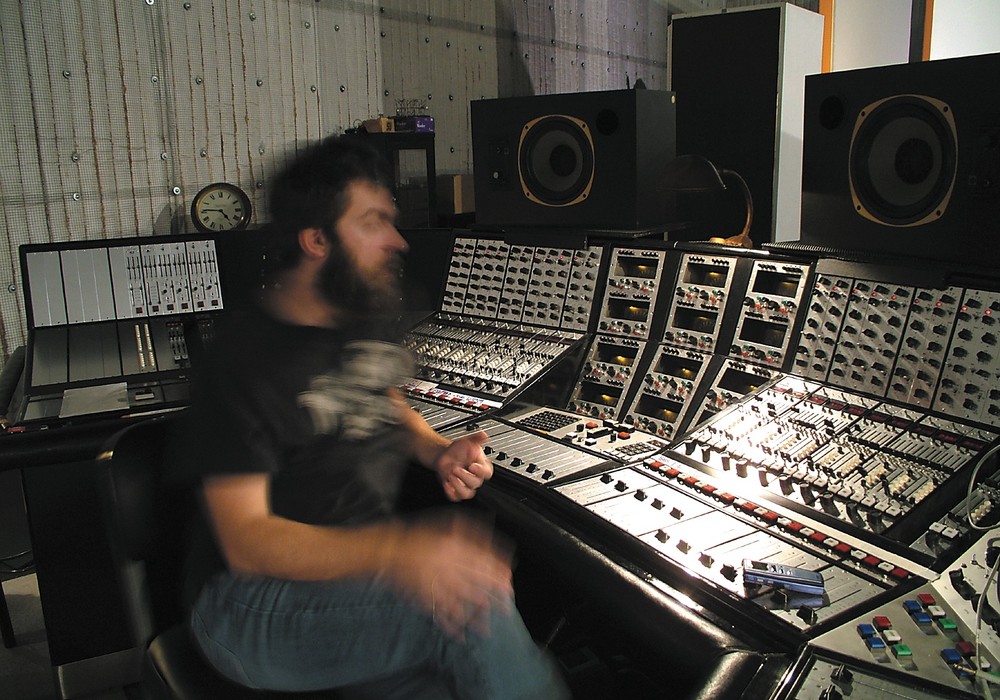Bob Dylan, Leonard Cohen, Public Enemy, Phish, A Tribe Called Quest, Super Furry Animals, Lou Reed, Jeff Buckley, Derek Trucks, Elvis Perkins, Bad Brains, Weezer, Ween and Wilco. These are just some of the seminal artists and bands whose music has passed through the formidable ears and brilliant mind of Chris Shaw. In his 20 years as a professional producer/mixer/engineer, he has worked on five of Rolling Stone's "500 Greatest Albums of All Time." His discography is monstrous, but anyone who has ever had the pleasure of meeting the man knows he is one of the sweetest and most unassuming gentlemen in the industry. He may have gotten far for his talents, but his lack of ego may be what defines him. With a boyish lisp and a sack full of stories, he instantly makes you feel welcome and on his level through his excitement and enthusiasm. I caught up with him in his Brooklyn apartment, exploring the life and career of the man who went from playing bass on LL Cool J's MTV Unplugged special to mixing Weezer's smash debut to becoming the man that Bob Dylan calls his engineer.
What sort of music did you listen to growing up?
My dad was a pretty good jazz pianist in Connecticut. I grew up listening to a lot of West Coast jazz — Brubeck, Bill Evans and Stan Getz. He was also a huge Oscar Peterson and Art Tatum fan. Waking up on Sunday mornings I'd hear my dad practicing, running through the Hanon exercises. My mom would be cooking, getting the sauce ready for the next meal. My mom's Italian, so on Saturday she starts the sauce for Sunday's meal. My brother was the big prog-rock fan. I used to listen to a lot of Yes, ELP and Jethro Tull. My sister was the AM radio pop girl. I had a pretty decent music collection to draw from as a kid. My brother went to MIT, and while he was there he became a music critic for the MIT newspaper.
He'd get all these advance copies on vinyl months before they were released, so I was the first kid in my neighborhood listening to punk and no wave. My brother came back to attend Columbia, and I got really into King Crimson. In '79, Robert Fripp did this record called Exposure, and that was pretty much what made me decide to become an engineer. That was the first time I'd ever heard of Frippertronics. I was learning how to play guitar at the time and badgering my brother, "How the hell is he doing that?" He pulled out a copy of Discreet Music by Brian Eno, and there's a diagram on the back with the two tape machines and the single piece of tape.
I was first introduced to Frippertronics through Phish. Did you guys ever connect on that when you worked together on The Story of the Ghost?
Trey [Anastasio] and I connected on a couple things. To be honest, I was never really a huge Phish fan. I appreciated them, but working with them was actually awesome. Great guys and monster players. On the first day in the studio with Phish, Trey's going through my CD booklet and says, "Oh my God. This is record is the greatest." I'm wondering, "What is he looking at?" He pulls out My Bloody Valentine's Loveless, which caught me by surprise. He borrowed it and I never got it back. A few months later, he sent me a new copy in the mail because he broke my copy. [laughs] But we definitely bonded over Fripp. They were working on this song called "Brian and Robert." I said to him, "Is that who I think it is?" and he said, "That is indeed who you think it is."
Who are some of your touchstone producers?
It varies from moment to moment. I really don't buy records for producers. I'm really more into the engineers, and a band's relationship with certain engineers. I think Radiohead and Nigel Godrich have a great thing going on. I'm really into mixers, however I appreciate the guys who impart a sound on a record but don't overtake what a band does. There aren't that many "true producers" left — guys who come in and radically change what a band does for the better. Brian Eno is one of those guys. There are so many bands that ask me to work with them based on other things I've done and want me to do that with them. Then you start walking down that road and they get cold feet immediately. "Ah... That's not what we do. We can't do that." I have to say, "But you asked me to do this. If you don't want to do this, then fine. We'll go halfway there and see what happens." I personally am not one of those producers. I like to work with what the band has, try to figure out where they're trying to go and push them gently that way. I'm not going to walk into an Elvis Perkins' recording session and start doing an Eno thing...
When did you make that transition from engineer to producer?
I started producing bands after Weezer (The Blue Album).
How did that one come about?
I take that back. I produced an EP in Seattle before I did Weezer. It's funny, because they tie in. I was working on this EP and I was trying to get the guitar player to do that EBow solo that The Cars did on "Since You're Gone." He wasn't getting it and I was like, "Don't you know 'Since You're Gone' by The Cars?" That drew a blank stare. The singer of this band was a real practical joker and he wasn't in the control room when I was trying to get this to happen. The phone rings and the receptionist at the studio says, "I've got Ric Ocasek on the phone for Chris Shaw." Thinking it was the singer, I was like, "Right! Whatever! Ha ha!" I hang up the phone. Then the phone rings again, and this time the singer is in the room. The receptionist says, "I've got Ric Ocasek on the phone for Chris Shaw, again." I pick up the phone and it's Ric. "Umm, sorry Ric." He had just recorded an album in his basement and he was looking for someone to mix it. Mary Campbell, the manager at Electric Lady, recommended me. So I went down to his house, he played me his roughs and asked me if I wanted to work on the record. So I did that with him and a couple months later he called me back. "There's this band from L.A. called Weezer that wants me to produce their record. Why don't you come to the house, I'll play you the demos and, if you like it, we'll do it together." So he played me the Weezer demos and they were really funny. Believe it or not, the vocals were really out-of-tune. Really quirky and crappy 16-track demos. It was so obvious that the geek factor was really high. But, if anything, it was going to be a lot fun so I said, "Sure." We wound up doing the whole record, and it wasn't until we got to the mix stage that I thought this might actually do well. I remember I was mixing "Buddy Holly" and people would come into the studio and recognize that it was a really good pop song. I thought, "Really? Well this might do something." When that record came out, it just blew up and did wonders for me. I worked my ass off on it. I'm really proud of the guitar sounds on that one as well.
Where was it mixed?
It was all done at Electric Lady. That's Ric's favorite studio.
Before that, you were actually very involved in the second-generation of hip-hop production...
I was an assistant at Greene St. Recording when Public Enemy first walked through the door to do It Takes A Nation of Millions To Hold Us Back. Nick Sansano, Rod Hui and everybody who worked at Greene Street had a hand in those Public Enemy records — some more than others, obviously. The very first mix I ever did for a major label was "Terminator X to the Edge Of Panic." That was actually a rough mix I had done for Hank Shocklee [Tape Op #51] one night. We had just finished doing a remix for Vanessa Williams; Rod Hui, the chief engineer, had just left. Hank was running into the room asking, "Where did Roddy go? I've gotta get a rough mix off to Rick Rubin." Rick Rubin was in the middle of doing this movie with Run DMC called Tougher Than Leather and they wanted a Public Enemy song on the soundtrack. So I spent an hour on it, put it on 1/2-inch tape and gave him a cassette afterwards. It was a really weird track because The Bomb Squad didn't do it — it was done by Terminator X himself and it was put together in a very lo-fi way. He played all the loops by hand and the timing was a little off. It was really kind of funky. Eventually, for the album, Roddy did a mix and Nick Sansano did a mix. When it came time to sequence the album, we played their mixes and then Hank pulled up my rough mix. Hank said, "I know that Roddy's mix sounds better and I know that Nick's mix sounds better too, but there is something really fucked up about Chris's mix that I like! It doesn't have that much bass on it and it's really annoying sounding, but something about that is really gonna work in the sequence." So that wound up being on the record!
Do you see the general production aspects of that period still influencing you?
Definitely, because I know how to do things the hard way. Looping today is a simple import; you set the tempo and then duplicate, duplicate, duplicate. Back then you got the record, EQ it, put it into the S900, figure out where the start point and end point are, figure out what the tempo is and tune the sample to the tempo. If that didn't work to the click, or if the four was flamming, then you'd edit the sample into two pieces — one to the four and then the four to the next one. Basically we were doing the whole Propellerhead ReCycle thing by hand. To lay down four loops that were matched for a basic hip-hop track was at least a six-hour process. But that kind of knowledge comes in handy when you're trying to make a loop work in Pro Tools. I learned how to do creative things like looping from the backbeat and time stretching. Even stupid things, like learning how to lock machines using time code.
You also worked on A Tribe Called Quest's The Low End Theory. How did that come about?
In 1992, I was working with a band that got called to be the backup band for MTV's Unplugged special where LL Cool J played "Mama Said Knock You Out." I got roped into playing bass for that! The band was also doing "Can I Kick It?" with Tribe, "Cappuccino" with MC Lyte, "Ring Ring Ring (Ha Ha Hey)" with De La Soul and I was rattling off all the samples to them! One of the guys in the band said, "I'm going to see if I can get you an acoustic bass so you can play with us." Even though I insisted I didn't know how to play, I got roped into it. So I spent the day figuring out these ridiculously hard basslines, performed and after the show, Q-Tip was talking to me about going on the road. I told him I was an engineer and playing bass wasn't what I actually do, but I also told him I worked at Greene Street. He picked up a phone, called his manager and booked two days with me at the studio. In those couple days, we built "Jazz (We've Got)" and a couple other tracks. That was the only thing I did with Tribe, but a lot of people who love that record tell me that's their favorite track.
Do you miss dynamic range on CDs these days?
Yes! Dynamics are what make a track! What's great about records from the '70s, all the way up through the early '90s, were the dynamics in it! When you'd turn it up louder, it sounded better — it feels like you're in the track and right there with the band. Wilco's A Ghost is Born was probably the last really dynamic record I've done. If you put on A Ghost is Born next to anything else, it's really quiet. That's because it's dynamics! Steve Rooke [Abbey Road's senior mastering engineer] did a wonderful job. He basically figured out what the loudest song was, normalized it and did minimum amounts of compression to keep everything at the same level. By other standards it's really quiet. I was listening to a Carole King record on the subway the other day and said, "This sounds amazing!" It's really dry. You can hear the squeaking of the pedals. Every once in a while, a guitar note gets too loud. All these really cool things are going on! It just seems that with Pro Tools and the loudness wars, everything is so loud and everything has to be perfect. You can't have a really loud mistake anymore! And with these highly- compressed, over-saturated mixes that are coming out now, you crank it up and it just hurts. Nothing changes — it sounds the same as it was on 5 as it is at 10...?
And most people are listening on headphones...?
Right! I've been listening to a lot of analog stuff I've been doing lately since Walter Sear [Tape Op #41] passed away. I was at his memorial a couple weeks ago and on the subway ride after the memorial, I hate to admit it, I was self-indulgently listening to really crappy MP3s of records I've done. And all the ones where I said, "Man, that sounds really good," those were all the ones that were sourced on analog. Every single one. I'm starting to sound like an old man, but it's really true! I'm starting to experience my own Pro Tools backlash but, unfortunately, there's not much I can do about it.
Is Jack Frost [Bob Dylan's nom de plume as a producer] a good producer to work under?
Jack is a taskmaster. And Jack is a really good song arranger as well. To be honest, Bob doesn't need a producer. I have a lot of respect for [Daniel] Lanois and everybody who has worked with him, because that's a tall order to sit there and have the balls to tell Bob Dylan what to do, but I honestly don't think that's what those guys did. I think their job was to get the rest of the band on board with whatever it was that Bob was doing.
Did you ever have creative input with those records?
Not really. Bob would ask me what I thought of a certain take, but he wouldn't ask me if a song was too long or if he should do it in this key or that key. Every once in a while they'd be out in the studio doing run-throughs and Bob would lean into the microphone and ask, "Chris, how does it sound in there?" So that's the only time I'd get to throw my opinion out and usually my answer has been, "Bob, I'm doing the best with what you're giving me." [laughs] "Well, then I guess we're not there yet..."
He's pretty notorious for his unpredictability. What is a typical session like?
Day one is usually the hardest day. I get to the studio as early as I possibly can. The hardest thing about it is you don't know what's gonna happen when Bob walks through the door. You don't know if it's an acoustic song, an electric song, blues, country or jazz. You have to be ready to record any kind of music at any given time. The way I prepare is that I have as many microphones as I can possibly put out there and make it work! Bob will be playing guitar — and you can always tell when this is about to happen — in the middle of a take he'll want to switch over to piano. He'll put the guitar down, walk over to the piano while the band is still playing... and you better have a mic in that piano ready to go. He'll do two takes and he'll be like [in a Dylan voice], "Tony [Garnier], why don't you switch from electric to upright? I don't want you on acoustic — I want you on banjo. Put the lap steel over where you play fiddle. And I don't want you on the drum set — play a cardboard box with brushes! Okay, let's go!" So you only have 10 minutes to move mics into position and get a sound. It's about getting prepped ahead of time and getting a headphone mix that Bob likes because he judges everything by the headphone mix — if he's wearing them. He'll come in after a great take, I'll play the take he really likes and he'll say, "It doesn't sound anything like that in the headphones." Then I'll go to the headphone mixer and Bob's got every knob turned all the way up. [laughs] "Of course it doesn't sound like it, Bob! It's distorting!" I used to keep a second set of phones hooked up to his mixer; sometimes in the middle of a take I'd sneak up behind him and adjust the headphone mix without him seeing me. At the end of the take he'd say, "I don't know what happened but, man, in the middle of that last take the band really came together!" [laughs]
It sounds to me like he has amazing vocal technique. Would you say that's true?
He does, but his voice is so mid-rangy that it cuts through anything. He doesn't need too much mic technique. During Love and Theft he actually hardly ever wore headphones. He'd just sing to what he was hearing in the room. And he'd get upset, because I always insisted on putting a [Shure] SM7 in front of him. He wanted to use an old ribbon mic, like an RCA 77, but the SM7 always won the shoot-out. People don't realize — Bob projects. That voice... it's loud! I think it's the nose.
Do you have assistants with you when you record him?
Yeah. It's the only time I'll ever pull a prima-donna act and tell the studio manager that he has to give me two really good assistants. If either one of them screws up, someone's gonna have to pay for it. I can't handle all that at once. I pride myself on keeping the session under control, but you've got 40 microphones out there to deal with. You need at least one guy sitting in the room with the band, unobtrusively in the corner with a pair of headphones, you need a guy in the control room on the patchbay and an intern looking at the Pro Tools meters. When I work with Bob, I always have him with his back to the control room because I'll be running around and grabbing knobs. There'll be a flurry of motion in there and he doesn't like seeing motion while a take is going down. He can't concentrate if people are moving.
Does he have a good knowledge base of engineering and mixing?
I wouldn't say that he's technically proficient. He's not gonna walk into the control room and say, "Put me on a 47 through a 1073 into an 1176." He'll walk in, look at the mic and ask, "Will this work for me?" and I'll say, "Yeah Bob. It's gonna work." He has worked with all these great engineers; as a result, the studio is kind of transparent to him. He's gonna walk in and expect everything to work.
Has everything always worked for you?
The Pro Tools rig crashed in the middle of a take during Modern Times, which was the first record he ever did in Pro Tools. On the first day, it crashed twice. I was really pushing the living daylights out of a computer in the studio that wasn't up to the task. Imagine walking into the room with Dylan playing and having to make him stop because of a computer crash!
How were the experiences different between Love and Theft and Modern Times?
They are really different records. I think Modern Times sold better, but I'm partial to Love and Theft for many reasons. First of all, Bob's band on that record was just stellar. You've got Charlie Sexton and Larry Campbell. The spirit of the sessions was a lot more positive. Not that Modern Times wasn't, but Bob had a big personnel change before he went into the studio. I just felt like the mood in the studio was slightly darker. I don't know if it was something Bob or the band was struggling with, but that record took a lot longer to make. Love and Theft was a three-week record, all analog and it was pre 9/11. Modern Times was Pro Tools.
Did you introduce Bob to the Pro Tools mistress?
I didn't force Bob to do Pro Tools. Pro Tools just kind of happened. After Love and Theft I got called out to L.A. to do a song for a movie soundtrack with Bob ["Cross The Green Mountain" from Gods and Generals]. We only had a day to do it.We did a lot of tape editing on Love and Theft - a lot of verse reordering. I told Bob's manager that if we were going to do a lot of editing on this cut for the soundtrack, it would be a good time to try Bob on Pro Tools. We ran an analog machine just in case. We did four takes of the song and Bob is telling me from the live room he loved take three but preferred the end of take four. He starts meandering back in, talking to Tony; about two minutes later he's in the control room and asks, "You need a half-hour to do that edit, right?" I said, "No Bob, I'm done." He starts laughing and says, "You're not done. I don't believe you." I played it for him and he looked at me and said, "You're a genius!" [laughs] We mixed it the next day, which is another funny story. I asked Bob's manager to have Bob come at 4 pm for mixing, because I knew full well Bob would show up at 2 pm. So I started at 9 am. I was working on the mix furiously when Bob showed up and I still wasn't done. Bob hates being in studios, so when he's waiting for a mix he gets a little impatient. After an hour of waiting, he walks to the console and asks, "Chris, what are you doing?" "Mixing, Bob." 'I know you're mixing, but what are you doing?" "Trying to make it sound better, Bob!" "Better than what?" "Better than it sounded yesterday." "I understand. You're the genius here, but let me tell you what I know about mixing..." I'm thinking, "Oh boy, here it comes. Bob Dylan is going to tell me what he knows about mixing. This is really going to be interesting." "...let me tell you what I know about mixing. I work with these engineers, they put the tape on, they push up the kick drum fader, spend 10 minutes doing whatever it is that they do and that kick drum sounds fantastic. Then they push up the snare drum and they do the same thing. So that kick and snare sound fantastic. They keep working down the line until they get to the end of the song and now everything sounds fantastic, but the song doesn't sound good." I got the message, so I asked Bob for 20 minutes. I looked at the console, took out all the inserts, took out all the EQs (except what was on his vocal), pulled down all the faders, pushed everything back up and thought it sounded pretty good. But then I A/B'd it to what I had before and, motherfucker, it was great. [laughs]
You heard it from the man himself. It's all about the song.
No matter how good you are, even the big guys, every once in a while an artist puts you in your place in the same way. I have no problem when a band asks for something that is out of the scope of how I normally do things. Who knows? It could be something really great and something I'll apply later. It's also not my record! People are buying it because it's a Bob Dylan record. Only geeks like you and me are buying it because they know the engineer.
What's your favorite song or album of his you didn't work on?
I really wish I had done "It's Alright, Ma (I'm Only Bleeding)." The lyrics are more appropriate today when he originally wrote them. Amazing song. He does a really cool version of it now that's radically different. I asked him if he'd ever do it again like the album version and he said, "A record is just a recording of what you were doing that day. You don't want to live the same day over and over again, now do ya?" There's the reason why he does things so differently live. But actually... I really wish I could've done Desire because I think it's Bob's worst sounding record and it has the greatest songs on it!
I saw an article that incorrectly stated you had mixed the Dylan records "in the box," which you went on to publicly correct, saying that you never mixed that way. But that's no longer the case. How has the transition been for you to mixing in the box?
It's been an interesting one. Frustrating. I can't stand mixing with a mouse, but I'm adapting to it. I've got one of those Frontier AlphaTrack single faders. I hope to pick up the Euphonix 8-channel controller. The transition is weird but liberating, because I can mix a record for anybody, at almost any budget, these days. Budgets being the way they are now, you can kind of set your own hours to a certain degree.
You mixed the recent Leonard Cohen Live At The Isle of Wight 1970 project.
The label was like, "See what you can do with this, Chris. If you can't clean it up, we're not going to release it." Leonard's set was at three o'clock in the morning and they were setting up another band behind him. As par for the course, the roadies were plugging things in. Grounds were being lifted throughout songs. There were a ton of ground hums and buzzes, so a majority of that project was restoration work and the iZotope stuff really shined in that situation — the Spectral Repair for getting out the pops and the Denoiser for getting out the hums. And it turns out the guy who wrote the iZotope code is a massive Leonard Cohen fan!
What do you see as the biggest upside, as well as the biggest downside of mixing in the box?
The biggest upside of mixing in the box is you can do recalls really easily, but the biggest downside is that you can do recalls really easily. On a recent record, I revisited one mix at least 13 times!
Do you have an item in your contract that limits mix revisions?
I should, but I won't. I want to make the artist as happy as possible. I bring up revisiting this track 13 times and it sounds like a pain in the ass, but honestly it's not that much work, especially if you've got it in the box. You also can't refuse, because you want the artist to come back to you. If you say no, you'll never work with that artist again and you don't want that reputation. Another thing I don't like about in the box transition is that I'm missing specific analog sounds. Plug-ins come close, but they force you to compromise your own integrity on how you would like things to sound.
What are some of the Chris Shaw rules of recording?
I would rather work with the world's greatest drummer, in the world's worst studio, than the world's worst drummer in the world's greatest studio. It all comes down to the player. People always ask, "How do you get a really great drum sound?" The secret is a really great drummer! Then, after that, it's the drum set, then it's the room and then it's the microphones, console — the last person in the chain is me. Above and beyond the drummer, it's the song and capturing what that song is about. The biggest mistake you can make is not paying attention to what the song is doing. If you're married to your drum sound, but it's not appropriate for the song, then it's the world's worst drum sound.
One of my favorite rules is that the artist is always right, but don't tell them that they're right...
That is pretty true. However, as a producer, you have to be cognizant of when the artist is doing the wrong thing. When he's spinning his wheels and paying too much attention to things that aren't really going to change the song altogether. For me, it's about making the studio transparent. It's hard not to, but the artist shouldn't be aware that they're recording. You're there to capture the lightning in the jar. Long ago I told Kevin Killen how much I loved the drum sounds on Elvis Costello's Spike and he, in turn, told me he spent very little time getting any sounds on that record. He threw the mics up, got a really good level, did just enough EQ to make things sound decent and hit record. He said, "When the artist looks up and says, 'Go,' you have to be going. There's enough technology out there to fix just about anything." And he was talking about that in 1987! That is one of the beautiful things about Pro Tools. It allows you to get to work faster. But what matters is capturing a beautiful performance, and that's it. I mean James Brown records are the worst sounding records on the planet, but the performances are amazing! The first Beatles record sounds like shit compared to what recording has developed into today, but the reason why it's great is because it's The Beatles! Zeppelin's "When The Levee Breaks" has a really cool drum sound, a benchmark for many, but it's kind of crappy sounding. It's really muddy, but the reason it's great is because it's a badass groove. Andy Johns had the foresight to turn on a delay and get the delay time right; Bonham played to the delay and they hit that magic moment, y'know? That's what you've got to do as an engineer. Fiddle around enough with the technology so that it inspires the artist to do something different, but not to the point where the artist is like, "Okay Chris, that's nice but will you now take off that echo, please?"
This may seem silly to ask, but what is your five-year plan?
I've actually always felt my career has functioned in five- year cycles. But with the industry being in flux, and now that I'm doing more work at home, I feel there's a whole other thing coming up. Yeah, everybody and their mother has a Pro Tools rig these days, but there's only a handful of us left who know the analog ways, who can actually take the in-the-box approach and make it as good sounding as it can possibly be. So, I guess my five-year-plan is to prove it can be done; and to also push forward the concept that people should give a shit about the audio quality. I'm really hoping that happens soon. I'm really disappointed with the general public's acceptance of crappy audio, especially given now that there is this insatiable demand for incredible visuals. Everyone's buying HDTV and Blu-ray. Everyone wants to see everything in 3-D. But they're happy to listen to a 128-bit MP3? It's mind-blowing. The only people who are going to change this are the artists and, unfortunately, I think too large a portion of the artists have accepted this as the norm. I don't know what the solution is, but it has to happen. Otherwise, we'll be out of jobs!
